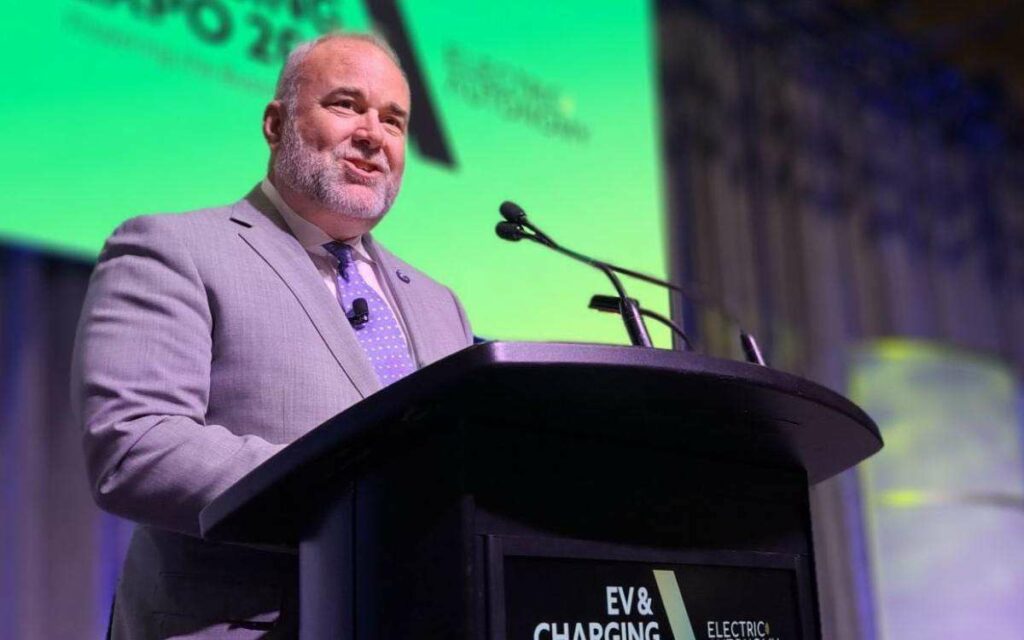
This recent decision to overturn an unrealistic OEB decision demonstrates a practicality that is sorely needed in many of our energy policy discussions today. Hopefully, that practical approach will prevail in future energy policy decisions in Ontario and the rest of Canada. Pictured is Minister of Energy Todd Smith. Photo Credit: X/Todd Smith.
As it happened just before the Christmas holidays began, a smart decision on energy issues made by the Ford government did not attract the attention it deserved. The Ontario Energy Board (OEB) came out with a decision on Dec. 21 on the matter of Enbridge Gas expanding its gas grid very significantly. This project is expected to be a multi-billion dollar undertaking. In its application to the OEB, Enbridge had made the assumption that virtually all new homes being built in the province would be connected to the gas system and that those customers would remain gas consumers for the next 40 years.
The OEB decided that Enbridge’s plan was unreasonable as it did not sufficiently take into account the energy transition away from fossil fuels and the plans underway for electrification. Electrification refers to the plan to shift all power to electric and to have that electricity generated by non-fossil fuel sources. The OEB concluded that the Enbridge proposal “is not responsive to the energy transition and increases the risk of stranded or underutilized assets.”
The OEB decision went on to say that gas connections to new homes must be paid for immediately by the developer, as opposed to the usual process of having them paid for by residents over a 40-year time period. This would mean a charge of about $4,400 to developers to connect a home to the grid. The OEB also mentioned that developers could install heat pumps instead of gas furnaces, despite the fact that heat pumps have not demonstrated that they are reliable in Canada’s cold winters.
The overall tone of the OEB decision was very much consistent with the environmental organizations’ ongoing crusades to have fossil fuels eliminated from our energy sources. Unfortunately, alternative energy generation such as wind and solar power have consistently proven to be unreliable and costly. Most environmental groups continue to oppose nuclear power as well, which remains the only non-fossil fuel source which can provide reliable and cost-effective energy with current technology.
Thankfully, the Ontario government wasted no time in stating that it will seek to overturn this decision. Energy Minister Todd Smith didn’t even wait for a full day before declaring that he would be looking to introduce legislation to reverse the OEB decision as soon as possible. Smith said this decision would have the effect of discouraging badly-needed new home construction, especially regarding affordable housing. The decision would also discourage developers from using natural gas, one of the most efficient and cost-effective energy sources, in new housing developments. Enbridge also stated its intention to challenge the decision.
The climate lobby was elated by the OEB decision. They were then, of course, incensed at the Ontario government’s promise to overturn it. But the vast majority of Ontarians should be pleased, as overturning this decision ensures that reliable, affordable natural gas will continue to be an option for them for the foreseeable future. Climate activists do not seem to take into account the impact of their recommendations on average people, and regularly underestimate the cost implications. As we have seen in Europe and some parts of Canada, over-reliance on energy sources like wind and solar have led to risky brownouts and blackouts. In a large, cold country like Canada, we can’t take a chance on unreliable energy supplies. Technological developments in the future may reveal ways to reduce our dependence on fossil fuels, but at present they remain the most reliable, cost-effective means of supplying the energy on which households and businesses rely.
Over the past few years, the Ontario government has pursued a mixed strategy on energy development. On the one hand, they have announced an electrification plan, while also announcing new natural gas plants and nuclear facilities. This recent decision to overturn an unrealistic OEB decision demonstrates a practicality that is sorely needed in many of our energy policy discussions today. Hopefully, that practical approach will prevail in future energy policy decisions in Ontario and the rest of Canada.

She has published numerous articles in journals, magazines & other media on issues such as free trade, finance, entrepreneurship & women business owners. Ms. Swift is a past President of the Empire Club of Canada, a former Director of the CD Howe Institute, the Canadian Youth Business Foundation, SOS Children’s Villages, past President of the International Small Business Congress and current Director of the Fraser Institute. She was cited in 2003 & 2012 as one of the most powerful women in Canada by the Women’s Executive Network & is a recipient of the Queen’s Silver & Gold Jubilee medals.


















